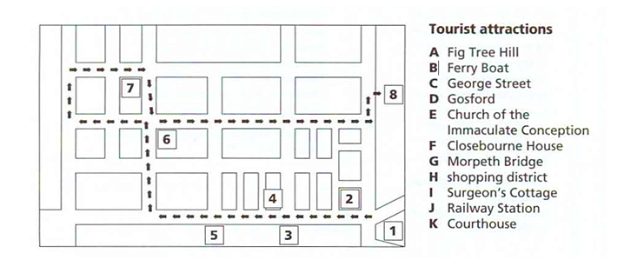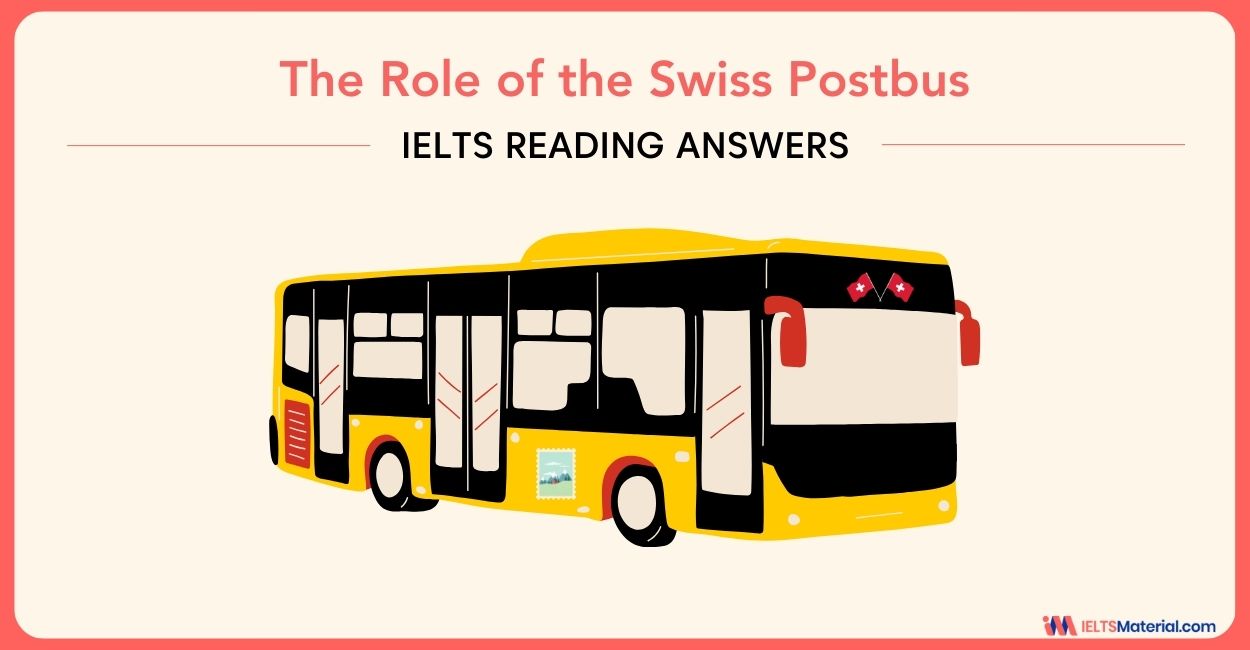Town of Morpeth, Community College Courses & Employment in Japan – IELTS General Reading Practice Test 8 with Answers
Table of Contents
Limited-Time Offer : Access a FREE 10-Day IELTS Study Plan!
The IELTS General Training Reading will give you 60 minutes to complete 3 sections where the question subject will be everyday/ general topics.
Section 1
You should spend about 20 minutes on Questions 1-14, which are based on Reading Passage 1 below.
Use the information in the description below to answer Questions 1 to 3. Write your answer in boxes 1-3 on your answer sheet.
Town of Morpeth
Morpeth is today a small town about two hours’ drive north of Sydney. The town of Morpeth grew from an original 2000 acres of land given to an English army officer, Lieutenant Edward Close (1790-1866), in 1821. During the 1830s and 1840s Morpeth became a major river port, due to its favourable location. Produce, hides and timber were brought to Morpeth from inland New South Wales and shipped down the Hunter River to the coast and then to Sydney. However, in 1870 a railway line reached the town, and the importance of river shipping began to decline. Today, Morpeth, with its beautiful old buildings, is a popular tourist destination.
- When was Lieutenant Close given the land on which Morpeth grew?
- On what river is Morpeth situated?
- When did trains first get to Morpeth?
Questions 4 -7
There are four advertisements on the next page for places to stay near Morpeth.
Answer the questions below by writing the letters of the appropriate advertisements in boxes 4-7 on your answer sheet.
1 Which TWO places to stay have restaurants?
2 Which place claims to offer the cheapest rate?
3 For more information, to which place can you telephone free of charge?
4 At which place can the guests cook their own food?
WHERE TO STAY Accommodation
A
Country Comfort Inn, Hunter Valley
The Country Comfort Inn, Hunter Valley, is a beautifully restored 125-year-old building just 20 minutes from the vineyards.
Formerly an orphanage, the Inn is set on 10 acres of landscaped gardens complete with a pool, sauna, tennis court, spa, gym, billiard room, guest lounge, fireplace, cocktail bar, and two restaurants. Special packages are available.
New England Highway, Maitland.
Call toll-free 1800 065 064
or (049) 32 52 88
B
Siesta Motel
“Spend a night – not a fortune”
That’s the Budget Motel chain motto. The Siesta Motel, rated 3-star, is conveniently placed at the gateway to tire winery district and nearby to the historic towns of Morpeth and Wollombi.
The family-owned and operated Siesta offers air-conditioned comfort and a friendly atmosphere. A free light breakfast is delivered to your suite and excellent meals are available at the Maitland City Bowling Club next door. Quality of accommodation is assured and the tariff is the lowest in the district.
258 New England Highway, Maitland.
Phone (049) 32 83 22
C
Endeavour East Maitland Motel
28 modern, comfortable 3-star units which open onto the swimming pool and barbeque area. All units feature TV and videos, air- conditioning, 2 with spas.
Fully licensed restaurant with cocktail bar and lounge is open 7 nights. Close to all amenities.
New England Highway, East Maitland.
Phone (049) 33 54 88
D
Eskdale Country Cottages
Rustic cottages secluded amongst gum trees provide quietness and privacy on 200 acres. The cottages are located on the historic beef cattle property, “Eskdale”, nestled in the Williams Valley. Each cottage is completely self-contained having 2 bedrooms, full kitchen facilities, and sitting rooms with TV and video and offers comfortable rural accommodation to those who enjoy the delights of the country yet still retain access to the city. Situated close to the towns of Morpeth, Maitland, Port Stephens & rainforests around Dungog.
Nelson Plains Road, Seaham NSW 2324.
Phone (049) 88 62 07, 88 62 09
Fax (049)88 62 09
Questions 8 – 14
Read the description below of the town of Morpeth and answer the questions that follow.
The best way to see Morpeth is to take the Morpeth Heritage Walk. This covers about three kilometres and takes visitors past many beautiful historical buildings. Starting at Fig Tree Hill, which has picnic facilities, stroll past the Surgeon’s Cottage, built in 1845, formerly home of the local doctor, now shops. From there you will come to Morpeth Bridge, erected in 1870, which replaced a ferry boat. Opposite it on the right is the Courthouse, still in use today. Continue your walk past the historic Railway Station, then turn into George Street. Stroll past gracious houses until you come to the Church of the Immaculate Conception on your right, built of bricks made in Gosford. Continuing up George Street, you come to the shopping district; browse through the shops or stop for refreshment. Your tour of Morpeth will finish at magnificent Closebourne House, built in 1826 by Lieutenant Edward Close.

Tourist attractions
A Fig Tree Hill
B Ferry Boat
C George Street
D Gosford
E Church of the Immaculate Conception
F Closebourne House
G Morpeth Bridge
H shopping district
I Surgeon’s Cottage
J Railway Station
K Courthouse
Using information from the text, fill in the names of the numbered tourist attractions on the map. Write your answers in boxes 8-14 on your answer sheet. The first one has been done for you as an example. Note: there are more names than you will need.
Example: 1 = A
- 2 =
- 3 =
- 4 =
- 5 =
- 6 =
- 7 =
- 8 =
Reading Passage 2
You should spend about 20 minutes on Questions 15-25 which are based on the Reading Passage below.
Below are tile course descriptions for five courses offered by a local community college.
Read the descriptions and answer questions 15-25.
Community College Courses
COURSE A
If you have no previous experience with computers, or you have some gaps in your knowledge of the basics, then this is an appropriate course for you. This course will give you a thorough grounding in the fundamental concepts of computing common to all computers. It is a practical “hands-on” course that looks at how a computer operates and how the programs work. Using three of the most widely used programs in business, you will learn the basics of word processing, spreadsheets and databases. By the completion of the course, you will be productive at a basic level and competent to progress to the elementary level of any of the specialised programs. No previous computer skills assumed.
2 days
Fee: $279
25045 Wed/Thurs 12, 13 April 9.15 am-5.15 pm
25006 Tues/Wed 30, 31 May 9.15 am-5.15 pm
COURSE B
In dealing with your customers you are in a position of great importance. Your abilities directly influence the company’s bottom line. This course will look at ways to revitalise the customer contact skills you already have and add many more. Learn ways to improve your communication with customers, at all levels; techniques to use with difficult customers, how to confidently handle complaints and keep your cool in stressful situations. Most importantly, you will learn to build goodwill and trust with your customers. Course notes, lunch and refreshments provided.
Joshua Smith
Fee: $145
25026 Sat 20 May 9.00 am- 4.00 pm
COURSE C
Everything you need to know before purchasing or starting a coffee shop, tearooms or small restaurant. A useful course for all aspiring owners, managers, and employees of these small businesses to assist them in ensuring they don’t make expensive mistakes and that their customers return again and again… Bring lunch. Notes and manual available (if required) for $25 from Tutor.
Sarah Bridge
Fee: $55 (no concession)
25252 Sat 6 May 10.00 am- 3.00 pm
COURSE D
This course covers three areas of business communication:
Interpersonal Communication
Telephone Skills
Business Writing Skills
Learning Outcomes: At the end of the course participants will be able to effectively: Plan and write workplace documents in plain English; gather, record and convey information using the telephone and in a face-to-face situation; interact with clients within and external to the workplace about routine matters using the telephone and face-to-face contact. An excellent course for those entering or returning to the workforce. A Statement of Competency is issued if the assessment requirements are successfully completed.
Douglass McDougall
Fee: $135
25021 Wed 3 May-21 June 7.00-9.00 pm
COURSE E
Are you hating work, wanting a different job, needing a change or wanting a promotion? Come along to a new two-day program for women. We will explore your work goals and what holds you back, your fears in a work environment and how you handle them, your image and what it says to others, your communication style and what it says. You will develop more confidence to make changes, get clearer about what you want and have the courage to act. It is a relaxed, informative and fun workshop with lots of practical tips!
Sophie Bradley
Fee $199
25036 Sun 18, 25 June 9.30 am – 4.30 pm
Questions 15 – 19
Choose the title which best fits each course and write the number I to IX in boxes 21-25 on your answer sheet.
Note: there are more titles than you will need.
I MANAGING EXPANSION IN YOUR RESTAURANT
II MAKING CAREER CHANGES FOR WOMEN
III EFFECTIVE WORKPLACE COMMUNICATION
IV EXCEPTIONAL CUSTOMER SERVICE
V ADVANCED COMPUTING SKILLS
VI COMMUNICATING EFFECTIVELY
VII INTRODUCTORY COMPUTER SKILLS
VIII RESTAURANT MANAGEMENT FOR NON-MANAGERS
IX BUSINESS WRITING COURSE
Course A 15 _________
Course B : 16 _________
Course C : 17 _________
Course D : 18 _________
Course E : 19 _________
Questions 20 – 24
From the information about the courses, answer Questions 20 – 24 by writing the appropriate LETTER OR LETTERS A-E in boxes 20-24 on your answer sheet.
20 Which course is not specifically related to people’s jobs?
21 In which course are men not invited to participate?
22 Which TWO courses have course notes to go with them?
23 Which course will deal with writing skills?
24 Which course is on at night?
Question 25
Three of the courses specifically cover the same subject.
Choose the subject from the list below and write its name in box 25 on your answer sheet.
Writing skills
Computers
Communication
Finance
Work goals
Management
25 ………………
Section 3
Read the passage below and answer the questions that follow.
Employment in Japan
A
Every autumn, when the recruitment of new graduates and school leavers begins, major cities in Japan are flooded with students hunting for a job. Wearing suits for the first time, they run from one interview to another. The season is crucial for many students, as their whole lives may be determined during this period.
B
In Japan, lifetime employment is commonly practised by large companies. While people working in small companies and those working for subcontractors do not, in general, enjoy the advantages conferred by the large companies, there is a general expectation that employees will, in fact, remain more or less permanently in the same job.
C
Unlike in many Western countries where companies employ people whose skills can be effective immediately, Japanese companies select applicants with potential who can be trained to become suitable employees. For this reason, recruiting employees is an important exercise for companies, as they invest a lot of time and money in training new staff. This is basically true both for factory workers and for professionals. Professionals who have studied subjects which are of immediate use in the workplace, such as industrial engineers, are very often placed in factories and transferred from one section to another. By gaining experience in several different areas and by working in close contact with workers, the engineers are believed, in the long run, to become more effective members of the company. Workers too feel more involved by working with professionals and by being allowed to voice their opinions. Loyalty is believed to be cultivated in this type of egalitarian working environment.
D
Because of this system of training employees to be all-rounders, mobility between companies is low. Wages are set according to the educational background or initial field of employment, ordinary graduates being employed in administration, engineers in engineering and design departments and so on. Both promotions and wage increases tend to be tied to seniority, though some differences may arise later on as a result of ability and business performance. Wages are paid monthly, and the net sum, after the deduction of tax, is usually paid directly into a bank account. As well as the salary, a bonus is usually paid twice a year. This is a custom that dates back to the time when employers gave special allowances so that employees could properly celebrate bon, a Buddhist festival held in mid-July in Tokyo, but on other dates in other regions. The festival is held to appease the souls of ancestors. The second bonus is distributed at New Year. Recently, bonuses have also been offered as a way of allowing workers a share in the profits that their hard work has gained.
E
Many female graduates complain that they are not given equal training and equal opportunity in comparison to male graduates. Japanese companies generally believe that female employees will eventually leave to get married and have children. It is also true that, as well as the still-existing belief among women themselves that nothing should stand in the way of child-rearing, the extended hours of work often do not allow women to continue their careers after marriage.
F
Disappointed career-minded female graduates often opt to work for foreign firms. Since most male graduates prefer to join Japanese firms with their guaranteed security, foreign firms are often keen to employ female graduates as their potential tends to be greater than that of male applicants.
G
Some men, however, do leave their companies in spite of future prospects, one reason being to take over the family business. The eldest sons in families that own family companies or businesses such as stores are normally expected to take over the business when their parents retire. It is therefore quite common to see a businessman, on succeeding to his parents’ business, completely change his professional direction by becoming, for example, a shopkeeper.
H
On the job, working relationships tend to be very close because of the long hours of work and years of service in common. Social life, in fact, is frequently based on the workplace. Restaurants and nomi-ya, “pubs”, are always crowded at night with people enjoying an evening out with their colleagues. Many companies organise trips and sports days for their employees. Senior staff often play the role of mentor. This may mean becoming involved in the lives of junior staff in such things as marriage and the children’s education.
I
The average age of retirement is between 55 and 60. For most Westerners, retirement may be an eagerly awaited time to undertake such things as travel and hobbies. Many Japanese, however, simply cannot get used to the freedom of retirement and they look for ways of constructively using their time. Many look for new jobs, feeling that if they do not work they will be abandoned by society. This has recently led to the development in some municipalities of municipal job centres which advertise casual work such as cleaning and lawn mowing. Given that Japan is facing the problem of an increasingly ageing society, such activities may be vital in the future.
Questions 26 – 33
The reading passage has 9 paragraphs marked A to I. Match each of the topics i to ix below with one of the paragraphs A- I and write the appropriate letter in boxes 26-33 on your answer sheet.
Example:
Topic i: how new employees are used in a company
Answer: C
Topic ii: women and Japanese companies
Topic iii: why men sometimes resign from Japanese companies
Topic iv: permanency in employment in Japan
Topic v: recruiting season: who, when and where
Topic vi: the social aspect of work
Topic vii: the salary structure
Topic viii: the recruitment strategy of foreign firms
Topic ix: Japanese people after retirement
Questions 34 – 36
Complete the sentences below with words taken from the reading passage.
Use NO MORE THAN THREE WORDS for each answer. Write your answers in boxes 34-36 on your answer sheet.
Japanese employers believe that moving professionals within companies and listening to workers’ views leads to 34_______________
Employees receive their wages monthly and a bonus 35_______________
Japanese workers often form close personal relationships and older staff may even become a 36_______________ to junior staff.
Questions 37 – 39
Choose the appropriate letter A-D and write it in boxes 37 – 39 on your answer sheet.
37 Company training in Japan
A is not important
B is for factory workers only
C is for professionals only
D is for all staff.
38 Foreign firms are keen to employ Japanese women because
A the women are more intelligent than men
B the women that apply are more capable than the men that apply
C the women will be only short-term employees
D the women prefer guaranteed security.
39 Japanese people continue to work after retirement because
A they need the income
B they miss working
C they assist in the family business
D they have no status outside employment.
40 Given that Japan is facing the problem of an increasingly ageing society, which activities are important in the future?
A lawn mowing
B industrial engineering
C cooking
D factory cleaners
Fill in the blanks by choosing words from the passage.
Also check :
- IELTS General reading practice test
- General Training
- The Birdmen Reading Answers for IELTS General
- IELTS Reading – Keyword Techniques – How to Use
- Mass Appeal of the Manta Rays – IELTS General Reading Answers
- General Reading Tips And Tricks
- Fordlandia Reading Answers
- The Water Crisis Reading Answers for IELTS General
- The Role of the Swiss Postbus – Reading Answers for IELTS General
- Master IELTS Reading in 7 Days (Video)
- How to get 8 bands in IELTS?
Answer Key
Section 1
Unlock Section 1 Answers
| 1 | 1821 |
| 2 | (The) Hunter (River) |
| 3 | 1870 |
| 4 | A & C |
| 5 | B |
| 6 | A |
| 7 | D |
| 8 | I |
| 9 | G |
| 10 | K |
| 11 | J |
| 12 | E |
| 13 | H |
| 14 | F |
Section 2
Unlock Section 2 Answers
| 15 | VII |
| 16 | IV |
| 17 | I |
| 18 | III |
| 19 | II |
| 20 | A |
| 21 | E |
| 22 | B & C |
| 23 | D |
| 24 | D |
| 25 | Communication |
Section 3
Unlock Section 3 Answers
| 26 | E |
| 27 | G |
| 28 | B |
| 29 | A |
| 30 | H |
| 31 | D |
| 32 | F |
| 33 | I |
| 34 | loyalty |
| 35 | twice a year |
| 36 | mentor |
| 37 | D |
| 38 | B |
| 39 | B |
| 40 | A |
Start Preparing for IELTS: Get Your 10-Day Study Plan Today!
General Reading Practice Tests



Recent Articles

Kasturika Samanta

Janice Thompson


Kasturika Samanta




Post your Comments